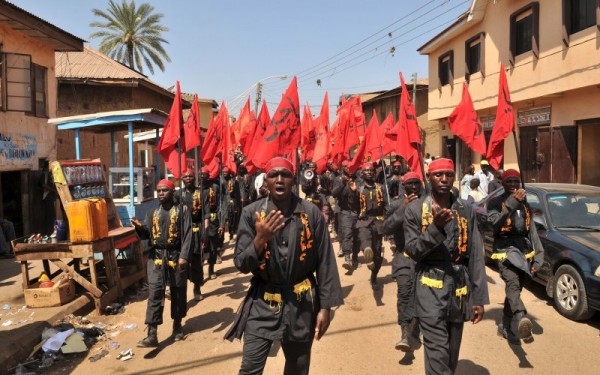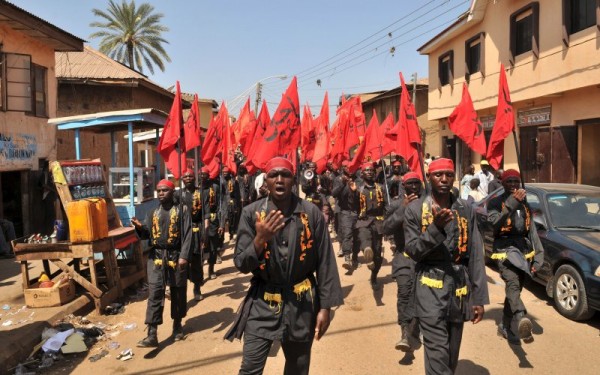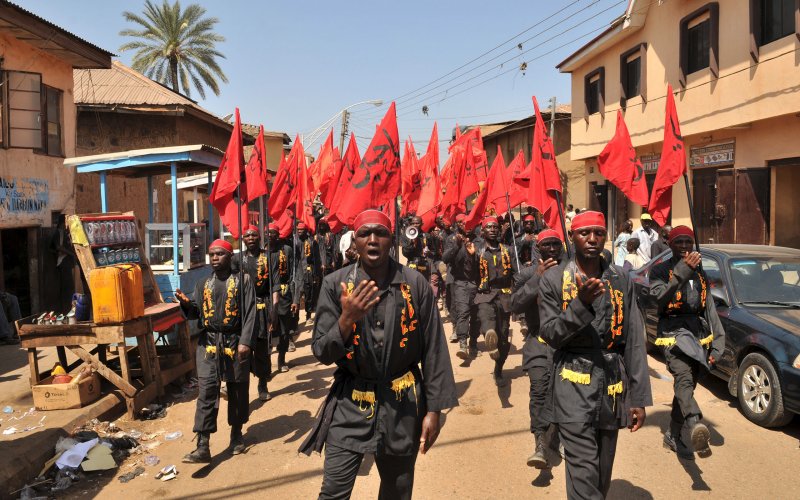
 Ibrahim Zakzaky is a mortal enemy of Boko Haram—and of the United States. He’s the avant-garde of Iran’s gambit in Africa, and his followers were just massacred.
Ibrahim Zakzaky is a mortal enemy of Boko Haram—and of the United States. He’s the avant-garde of Iran’s gambit in Africa, and his followers were just massacred.
CALABAR, Nigeria — The Nigerian army has been accused of massacring a large number of Shia Muslims in the town of Zaria in Nigeria’s northwestern Kaduna state over the course of three days this month. Shia sources say hundreds, perhaps as many as 1,000, have been killed in fighting, but those numbers could not be confirmed independently.
The Nigerian authorities claim that members of the radical Islamic Movement of Nigeria (IMN) had attempted to assassinate the Nigerian Army Chief of Staff, Lt. Gen. Tukur Buratai, on Dec. 12 when his motorcade was passing through a Shia procession.
The incident suggests just how fractured and extensive unrest can be in Nigeria’s deep interior, far from Lagos, the thriving commercial hub of Africa’s biggest economy.
The clashes in this case were not between security forces and the infamous terrorist forces of Boko Haram, a radical Sunni Muslim group now affiliated with the so-called Islamic State. This group is led by converts to Shia Islam originally inspired by the Iranian Revolution in 1979.
The Nigerian military police claimed in a report that some members of the IMN were crawling through grass towards Buratai’s car, aiming “to attack the vehicle with [a] petrol bomb,” while others “resorted to firing gunshots from the direction of the mosque.”
One witness told The Daily Beast that the Shia protesters placed burning tires on the road as a barricade to prevent the approaching Buratai and his entourage from passing, and then stoned his convoy, a claim that has been denied by the IMN.
ADVERTISEMENT
Maj. Gen. Adeniyi Oyebade, commander of the army division in the area, said last week that the military acted because they had good intelligence that members of the Shia sect were gathering for an attack.
“I take that very seriously that the life of the [the chief of army staff] is under threat, and within the rules of engagement permissible by law, I had to bring the forces available to me to bring the situation under control and that was exactly what I did,” he said.
The IMN suffered many casualties, Oyebade said, but he insisted “there were also casualties among the security forces.”
The leader of the IMN, Ibrahim Zakzaky, was wounded in the fighting—and his son reportedly was killed. The Nigerian Army said it arrested both Zakzaky and his wife, Malam Zeenat Ibrahim.
Not surprisingly, Iranian officials were the first outside Nigeria to react. The country’s foreign ministry called the violence “unacceptable,” the official IRNA news agency reported, and officials summoned the Nigerian chargé d’affaires in Tehran to protest against the deadly clashes. Iranian President Hassan Rouhani also called his Nigerian counterpart, Muhammadu Buhari, to say that he expects the Nigerian government to compensate the families of the dead and injured.
Zakzaky, an Iranian-trained Shia theologian, became a proponent of Shia Islam around the time of the Iranian revolution in 1979, when he was inspired by the Ayatollah Khomeini. The overthrow of the Pahlavi dynasty by the Islamic Republic convinced Zakzaky that an Islamic revival was also possible in Nigeria. And on the sidelines, he may well have been encouraged by Iranian missionaries helping to establish and fund a Shia presence in Nigeria. In the last two decades, Iran has increased its influence here, and maintains a large diplomatic presence.
The Shia leader denies his movement gets any funding from Tehran, butmany of its leaders and adherents regularly visited Iran.
In 1996, when Nigerians faced repression under military rule, Zakzaky reportedly said, “Nigeria must become wholly Islamic and Allah proclaimed Lord of the entire nation.” That about half the population of Nigeria is Christian, and the vast majority of Muslims are Sunni, seems not to have deterred him.
Zakzaky is vehemently anti-American, and his supporters have been involved in many violent clashes with the state over the decades. Hundreds of his soldiers are in prison, and for approximately nine years during the 1980s and 1990s, Zakzaky was incarcerated by Nigeria’s military leaders, who accused him of civil disobedience.
The Shia leader has grown increasingly confident he can build a permanent Islamic state within the country. He denies his movement gets any funding from Tehran, but many of its leaders and adherents regularly visited Iran or have studied there.











Sign up on lukeunfiltered.com or to check out our store on thebestpoliticalshirts.com.